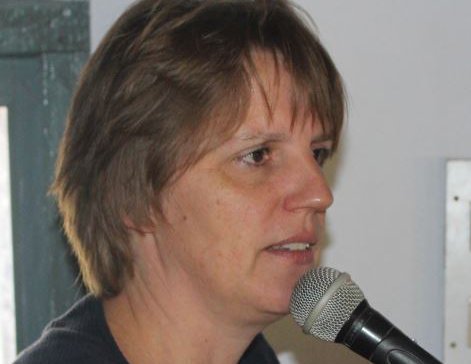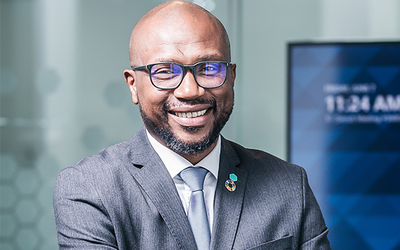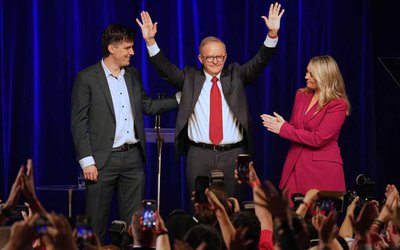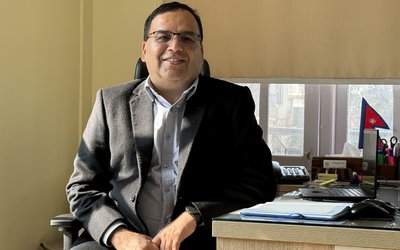
How do you see the overall political situation during your four months stay in Nepal?
First of all I have to say that I feel privileged and fortunate to have arrived in Nepal in 2017- a crucial year for the implementation of the constitution with local elections already passed and provincial and parliamentary elections still ahead. These elections are important cornerstones of the democratization process and the high turn-out of voters and the overall free and fair process shows the trust and conviction of Nepalese citizens in the path laid out by the constitution. These are very encouraging signs and a leap of trust given to the political leaders of this country. So there should and can be no leaning back on their part but an increased effort to constant work and dialogue with citizens to further develop the country. This is even more important as media reports on rampant corruption cases and misuse of authority have recently led to a further deterioration of trust in democratically elected decision makers and institutions. But going beyond elections, this year is a break in Nepal’s political history and offers realistic possibilities to reconnect the political process at the center with society at large, above all with debates and capacities at local level. Local communities have proven a high level of resilience in the post-conflict-period and are now at the center stage to provide basic state functions and deliver services to citizens or to activate the diverse parts of Nepali society for development. There are also chances that the Kathmandu-based political elite open up to new blood and political talents coming from different regions and divers ranges of society.
FES has been supporting to strengthen democracy in Nepal for long time. How do you evaluate your work?
Thanks to the dedicated and knowledgeable work of my predecessor(s) FES is a very acknowledged and trusted partner within the Nepalese political landscape. By offering platforms for discussion on current topics for experts and decision makers from all political affiliations FES has often contributed to overcome political deadlocks and to develop new consensus oriented proposals that tap on the collective experience of Nepal’s society. Furthermore, FES has been pioneering civic education in Nepal since 1997 and has been working with local communities as one of few international NGOs working on political development. Through its programs FES has built partnerships with a broad range of stakeholders on the district and community level. On this basis FES has increasingly engaged its local partners into political debates and processes at the center. Multi-stake holder dialogues served both as an opportunity to exchange views and experiences within diverse local settings but also to open up the elite circles at the center to new voices from society.
Given the changing context in Nepal, what type of programs do you think should FES organize in Nepal in the days to come?
I think, that the approach described above is well-proven in the Nepalese political context which is still of transitory nature. It fits very well with our social democratic profile. At the same time it’s a very valuable approach against the background of the decentralization process and allows for adaptions with regards to content, methodology, and regional scope according to the analysis of situation and the needs on the ground.In the upcoming years FES will continue to work on both levels, the political center and the local periphery. The aim is to enforce local actors voice in central political processes and promote dialogue and mutual understanding. Only conscious and active citizens can influence decision-making structures, exert surveillance and monitor reconstruction, peace, development and political processes meant for enriching democratic dividends. In the last 4 month I have been trying to assist in as many of our programs as possible, not only in Kathmandu but also in the country side. I have been sharing and discussing my observations on these activities with my team and our partners. At the same time we had and will certainly have intensive dialogues with our partners to discuss about their ideas for a continued cooperation. All of these input combined taking also in consideration the regional project lines of FES will form the future portfolio of our work.
FES has been helping to strengthen workers’ rights all over the world. How do you see your role in Nepal in this context?
Cooperation with trade unions is indeed one of the long-standing areas of FES-work in Nepal as well as in the region and internationally. I myself have a special connection to trade union work as my political socialization started in the early 90s in a metal factory in Germany where I did a three year apprenticeship as a locksmith and became an elected representative of young workers. I owe a lot to my trade union work which taught me that you can develop many ideas and concepts in a seminar room but ultimately, you have to get into the discussion with workers on the ground and deliver concrete improvements on their working and living conditions. Nepal’s trade unions have a substantive membership and have proven to be an active and resilient part of Nepal’s civil society. Yet, their impact in promoting decent work in Nepal is still limited both due to lack of the relevant capacities with regard to collective bargaining as well as political campaigning and lobbying. FES will continue to support trade unions via trainings and other capacity-building instruments, aiming at enabling the unions to use the decent work agenda to promote better working conditions and social standards at the working place. Furthermore, FES will be engaged in organizing dialogues between various trade union federations as well as with decision-makers from political parties and government in order to promote reforms on the national level that endorse the decent work agenda.
- MELAMCHI WATER SUPPLY: No Interruption During Monsoon
- Jun 25, 2025
- KOREAN RETURNEES: Successful Integration
- Jun 25, 2025
- UPPER TRISHULI-1: Engaging With Local
- Jun 25, 2025
- IME GROUP: Twenty Five Years Of Journey
- Jun 24, 2025
- NEPAL’S AIR POLLUTION: A Growing Health Concern
- Jun 24, 2025















